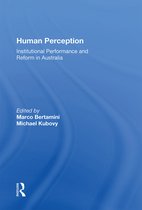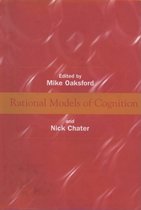The Making of Human Concepts
Afbeeldingen
Sla de afbeeldingen overArtikel vergelijken
Uitgever: Oxford University Press
Co-auteur:
Stephen E. G. Lea
- Engels
- Paperback
- 9780199549221
- 14 januari 2010
- 416 pagina's
Samenvatting
Human adults appear different from other animals in their ability to form abstract mental representations that go beyond perceptual similarity. In short, they can conceptualize the world. This book brings together leading psychologists and neuroscientists to tackle the age-old puzzle of what might be unique about human concepts.
Human adults appear different from other animals in their ability to form abstract mental representations that go beyond perceptual similarity. In short, they can conceptualize the world. This apparent uniqueness leads to an immediate puzzle: WHEN and HOW does this abstract system come into being? To answer this question we need to explore the origins of adult concepts, both developmentally and phylogenetically; When does the developing child acquire the ability to use abstract concepts? Does the transition occur around 2 years, with the onset of symbolic representation and language? Or, is it independent of the emergence of language? When in evolutionary history did an abstract representational system emerge? Is there something unique about the human brain? How would a computational system operating on the basis of perceptual associations develop into a system operating on the basis of abstract relations? Is this ability present in other species, but masked by their inability to verbalise abstractions? Perhaps the very notion of concepts is empty and should be done away with altogether. This book tackles the age-old puzzle of what might be unique about human concepts. Intuitively, we have a sense that our thoughts are somehow different from those of animals and young children such as infants. Yet, if true, this raises the question of where and how this uniqueness arises. What are the factors that have played out during the life course of the individual and over the evolution of humans that have contributed to the emergence of this apparently unique ability? This volume brings together a collection of world specialists who have grappled with these questions from different perspectives to try to resolve the issue. It includes contributions from leading psychologists, neuroscientists, child and infant specialists, and animal cognition specialists. Taken together, this story leads to the idea that there is no unique ingredient in the emergence of human concepts, but rather a powerful and potentially unique mix of biological abilities and personal and social history that has led to where the human mind now stands. A 'must-read' for students and researchers in the cognitive sciences.
Human adults appear different from other animals in their ability to form abstract mental representations that go beyond perceptual similarity. In short, they can conceptualize the world. This apparent uniqueness leads to an immediate puzzle: WHEN and HOW does this abstract system come into being? To answer this question we need to explore the origins of adult concepts, both developmentally and phylogenetically; When does the developing child acquire the ability to use abstract concepts? Does the transition occur around 2 years, with the onset of symbolic representation and language? Or, is it independent of the emergence of language? When in evolutionary history did an abstract representational system emerge? Is there something unique about the human brain? How would a computational system operating on the basis of perceptual associations develop into a system operating on the basis of abstract relations? Is this ability present in other species, but masked by their inability to verbalise abstractions? Perhaps the very notion of concepts is empty and should be done away with altogether. This book tackles the age-old puzzle of what might be unique about human concepts. Intuitively, we have a sense that our thoughts are somehow different from those of animals and young children such as infants. Yet, if true, this raises the question of where and how this uniqueness arises. What are the factors that have played out during the life course of the individual and over the evolution of humans that have contributed to the emergence of this apparently unique ability? This volume brings together a collection of world specialists who have grappled with these questions from different perspectives to try to resolve the issue. It includes contributions from leading psychologists, neuroscientists, child and infant specialists, and animal cognition specialists. Taken together, this story leads to the idea that there is no unique ingredient in the emergence of human concepts, but rather a powerful and potentially unique mix of biological abilities and personal and social history that has led to where the human mind now stands. A 'must-read' for students and researchers in the cognitive sciences.
Productspecificaties
Wij vonden geen specificaties voor jouw zoekopdracht '{SEARCH}'.
Inhoud
- Taal
- en
- Bindwijze
- Paperback
- Oorspronkelijke releasedatum
- 14 januari 2010
- Aantal pagina's
- 416
- Illustraties
- Nee
Betrokkenen
- Hoofdauteur
- Denis Mareschal, Paul Quinn, Stephen E.G. Lea
- Tweede Auteur
- Paul C. Quinn
- Co Auteur
- Stephen E. G. Lea
- Hoofdredacteur
- Denis Mareschal
- Tweede Redacteur
- Paul Quinn
- Co Redacteur
- Stephen E. G. Lea
- Hoofduitgeverij
- Oxford University Press
Overige kenmerken
- Extra groot lettertype
- Nee
- Product breedte
- 157 mm
- Product hoogte
- 25 mm
- Product lengte
- 233 mm
- Studieboek
- Ja
- Verpakking breedte
- 156 mm
- Verpakking hoogte
- 25 mm
- Verpakking lengte
- 233 mm
- Verpakkingsgewicht
- 625 g
EAN
- EAN
- 9780199549221
Je vindt dit artikel in
- Categorieën
- Taal
- Engels
- Boek, ebook of luisterboek?
- Boek
- Beschikbaarheid
- Leverbaar
- Studieboek of algemeen
- Algemene boeken
Kies gewenste uitvoering
Bindwijze
: Paperback
Prijsinformatie en bestellen
De prijs van dit product is 79 euro en 99 cent.
3 - 4 weken
Verkoop door bol
- Prijs inclusief verzendkosten, verstuurd door bol
- Ophalen bij een bol afhaalpunt mogelijk
- 30 dagen bedenktijd en gratis retourneren
- Dag en nacht klantenservice
Rapporteer dit artikel
Je wilt melding doen van illegale inhoud over dit artikel:
- Ik wil melding doen als klant
- Ik wil melding doen als autoriteit of trusted flagger
- Ik wil melding doen als partner
- Ik wil melding doen als merkhouder
Geen klant, autoriteit, trusted flagger, merkhouder of partner? Gebruik dan onderstaande link om melding te doen.









